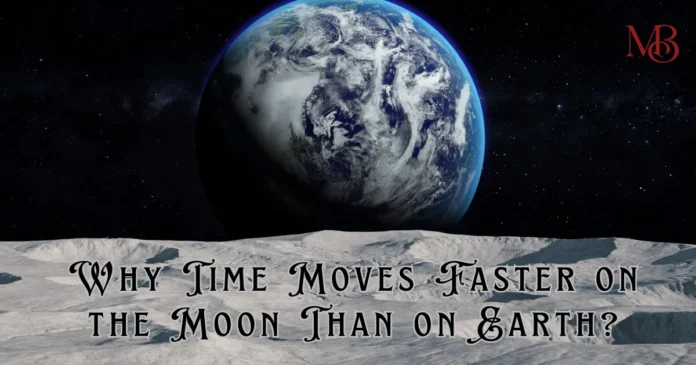Time Moves Faster on the Moon Than on Earth: Time is a constant—at least that’s what we assume. But thanks to Einstein’s theory of relativity, we now know that time can bend, stretch, and even speed up or slow down depending on where you are in the universe. One of the most intriguing phenomena linked to this theory is gravitational time dilation, which explains why time moves faster on the Moon than on Earth.
In this blog, we’ll explore the fascinating science behind gravitational time dilation, delve into the role of mass and gravity in altering time, and understand how this phenomenon affects life on Earth and space exploration.
Time Moves Faster on the Moon Than on Earth: Understanding Gravitational Time Dilation
Gravitational time dilation refers to the concept that time passes at different rates in regions of different gravitational potential. The idea stems from Einstein’s general theory of relativity, which posits that the presence of mass warps spacetime. The stronger the gravitational field, the more spacetime curves, and the slower time moves.
Key Concepts:
Spacetime: A four-dimensional continuum that combines the three spatial dimensions with time.
Mass and Gravity: Large masses, like planets and stars, create a curvature in spacetime, affecting the passage of time.
Relative Time: Time isn’t a fixed universal constant; it can differ depending on where you are relative to a gravitational source.
Time Moves Faster on the Moon Than on Earth: Why Time Moves Faster on the Moon?
The Moon’s gravitational pull is significantly weaker than Earth’s. This difference in gravitational strength leads to time moving faster on the Moon. But why exactly does gravity affect time?
1. Weaker Gravity on the Moon
The Moon has only about 1/6th of Earth’s gravity. Since time slows down in stronger gravitational fields, and Earth’s gravity is stronger, time runs slower on Earth than on the Moon.
– Earth’s Gravity: 9.8 m/s²
– Moon’s Gravity: 1.62 m/s²
As a result, the reduced gravitational pull on the Moon causes time to move faster relative to Earth.
2. Curvature of Spacetime
According to Einstein, mass causes spacetime to curve. The more massive an object, the greater its curvature and the more time slows down. The Earth’s greater mass compared to the Moon means it creates a deeper “well” in spacetime, slowing down time more significantly than on the Moon.
Time Moves Faster on the Moon Than on Earth: How Much Faster Does Time Move on the Moon?
While the difference isn’t dramatic in everyday terms, it is measurable. According to calculations based on general relativity, time on the Moon runs about 0.000027 seconds faster per day compared to Earth. This might seem insignificant, but over long periods, the difference adds up.
In the context of space missions, GPS satellites, or even theoretical lunar colonies, this discrepancy becomes crucial for accurate timekeeping and navigation.
Time Moves Faster on the Moon Than on Earth: Practical Implications of Gravitational Time Dilation
Understanding how time moves differently on the Moon compared to Earth is not just theoretical; it has real-world applications:
1. Space Exploration and Communication
For astronauts and spacecraft operating on the Moon, precise timekeeping is essential. Without accounting for gravitational time dilation, navigation systems and communication networks could experience errors.
2. GPS Systems
Earth-bound GPS satellites orbit at altitudes where Earth’s gravity is weaker than on the surface. These satellites experience time dilation, which engineers must correct to ensure accurate positioning data. Similarly, future lunar-based navigation systems will need adjustments for time dilation.
3. Lunar Colonies
As space agencies and private companies plan for human settlements on the Moon, understanding time dilation will be crucial. Clocks, schedules, and even biological rhythms could be affected by the faster passage of time on the Moon.
Time Moves Faster on the Moon Than on Earth: Einstein’s Legacy and Modern Observations
Einstein’s theory of relativity has been tested and confirmed in numerous experiments. The most famous involves atomic clocks placed at different altitudes on Earth. Clocks at higher altitudes, where gravity is weaker, tick faster than those at sea level, proving the theory.
NASA and other space agencies routinely account for these effects in their missions. From the International Space Station to interplanetary probes, understanding time dilation ensures successful mission planning and execution.
Time Moves Faster on the Moon Than on Earth: Philosophical Implications: Time is Relative
The idea that time can move faster or slower depending on gravity challenges our everyday perceptions. It reminds us that time is not a universal constant but a flexible dimension influenced by the universe’s forces. This concept has profound philosophical implications, prompting questions about the nature of reality, existence, and our place in the cosmos.
Time Moves Faster on the Moon Than on Earth: Looking Ahead: Time Dilation and Future Space Missions
As humanity looks to explore and colonize other celestial bodies, understanding time dilation will become increasingly important. Missions to Mars, lunar bases, and deep space exploration will all require precise time management, taking into account the effects of gravity on time.
In the future, we may even develop technologies to harness or manipulate time dilation for scientific and practical purposes, pushing the boundaries of what’s possible in physics and space travel.
Time moves faster on the Moon than on Earth because of the difference in gravitational strength. This phenomenon, explained by Einstein’s theory of relativity, has practical implications for space exploration, navigation, and timekeeping. As we venture further into space, understanding and accounting for gravitational time dilation will be crucial for success.
You might also like: Why Millennials Are Facing a Heart Health Crisis? Alarming Rise of Cardiac Arrests in Their 30s?
Einstein’s insights into the nature of time remind us that the universe is full of wonders yet to be explored. By embracing the complexities of spacetime, we can continue to push the boundaries of human knowledge and reach for the stars. Follow us on Newscast page.


